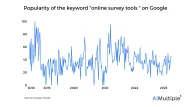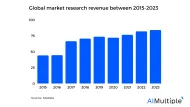Pharma Market Research: 10+ Trends & Real-Life Examples in '24
The pharmaceutical industry is facing several challenges, especially after COVID-19 and the changes the pandemic has brought to the pharma market and the healthcare landscape (see figure below). One way to understand the market dynamics and evolving needs is to conduct market research with healthcare providers, patients, and employees. Here, we provide the latest trends and some real-life examples of how market research can play a role in the pharmaceutical industry to help companies understand evolving healthcare models and gain a competitive advantage in the industry.
Source: McKinsey1
Figure 1. The network of forces in the pharmaceutical industry
If you are looking for a market research tool, you can check out our vendor’s deep dive on the top providers in the market.
Top 13 latest pharma market research trends
1- AI & automation
It usually takes 12 to 18 years for a new drug to get to the market, costing around $2.6 billion on average.2 By leveraging machine learning, deep learning, Natural Language Processing (NLP), or other AI technologies, pharmaceutical companies can:
- accelerate drug discovery
- enhance the accuracy of research
- streamline various phases of clinical trials.
This technology can analyze vast data sets more quickly and accurately than traditional methods, leading to more efficient identification of potential drug candidates and optimization of trial designs.
1.1. Generative AI
Pioneering pharma companies are harnessing generative AI to reshape drug discovery and development. Indeed, 44% of industry professionals view their quality IT infrastructure as dependent on numerous, independent IT systems.3 This trend marks a paradigm shift, as AI algorithms predict drug efficacy and safety profiles, drastically reducing the traditional decade-long drug development cycle.
Check out our comprehensive article on the use cases of GenAI in the healthcare industry if interested.
1.2. Digitalization
The top five pharmaceutical companies have declared over 50 investments in digital health firms and assets, doubling their digital health partnerships, emphasizing a strong focus on digitalization in the sector.4 Companies are integrating digital channels into their R&D, marketing, and patient engagement efforts, leveraging technologies like AI, IoT, and cloud computing to optimize operations and reach.
1.3. Sentiment analysis
91% of those involved in the pharmaceutical industry believe that adopting a patient-centric quality approach is a strategic benefit for their organization.5 To develop a patient-centric approach, the industry is increasingly using sentiment analysis. By mining social media and healthcare forums, companies can fine-tune their marketing strategies and product developments, ensuring they resonate with end-user expectations and experiences.
If interested, you can also check out how sentiment analysis is used in the healthcare industry.
Predictive modeling
AI-driven predictive modeling in pharmaceuticals involves analyzing data like sales history and disease trends to forecast drug demand. This approach helps companies make informed decisions about production and inventory, adapting efficiently to market changes and patient needs. As new data emerges, the AI continuously refines its predictions, enhancing accuracy and aiding in strategic planning.
Real-time market monitoring
Real-time market monitoring involves using advanced AI algorithms to continuously track and analyze market data. This includes monitoring competitor activities, drug pricing, regulatory changes, and consumer behavior to understand the market dynamics. By processing data from sources like social media, medical journals, and market reports instantly, companies gain actionable insights into emerging trends and market shifts.
2- Clinical pipeline tracking and disease landscaping
Companies are using advanced analytics to monitor drug development stages, predicting potential bottlenecks and market readiness. This strategic foresight is pivotal in maintaining a competitive edge in the fast-paced pharma industry.
3- Sustainability
Sustainability is no longer a ‘nice-to-have’; it is a ‘must-have’ in pharma. Companies are embracing green chemistry, waste reduction, and energy-efficient practices to achieve sustainable growth. These enable companies to be involved in a more eco-conscious market, ensuring long-term brand loyalty and corporate responsibility.
4- Strategic workforce planning
Demand for STEM-related roles in the life sciences industry in the United States has seen a 20% surge.6 As pharma ventures into new realms like genomics and personalized medicine, strategic workforce planning is crucial. Companies are actively reskilling their workforce and recruiting niche experts, ensuring their teams are equipped to navigate the evolving scientific and regulatory landscapes.
5- Development of partner ecosystems
In the face of complex drug development challenges, pharma companies are cultivating partner ecosystems. Indeed, research shows that more than 50% of companies are planning to significantly enhance their collaborative efforts with other industry players.7 These collaborations, ranging from academic institutions to biotech startups, are vital for innovation sharing and risk distribution, paving the way for groundbreaking therapies.
6- Technical product development
76% of survey participants don’t believe that their organization has yet reached the quality maturity it should have.8 Thus, the race for technical superiority in product development is intense. Companies are investing in advanced drug delivery systems, precision medicine, and next-gen biologics, aiming not just to participate in the market but to redefine it.
7- Personalized pharmaceutical products
Personalized medicine is transforming patient care. Pharma companies are leveraging genetic insights to tailor treatments, moving away from the ‘one-size-fits-all’ approach and towards therapies that offer higher efficacy and reduced side effects for individual patients.
8- Patient identification and stratification in clinical trials
Precision is key in clinical trials. Advanced analytics and AI are enabling healthcare professionals to identify and stratify patients, enhancing the efficacy of trials and speeding up the time to market for new drugs.
Real-life examples of market research in the pharmaceutical industry
PTC
PTC Therapeutics implemented the Interactions Hub, a digital solution by PwC, to streamline its processes.9 This move addressed the inefficiencies of their previous manual system, where staff spent about 25% of their time on administrative tasks. The new digital approach improved operational efficiency and compliance, enabling a more focused effort on strategic drug development initiatives.
Pfizer
VaxAssist, an online tool introduced by Pfizer, assists adults in determining their eligibility for various respiratory vaccines such as COVID-19, pneumococcal pneumonia, influenza, and RSV.10 This initiative responds to the confusion and hesitancy caused by an overload of health information and the “triple-demic” impact of flu, COVID-19, and RSV, which led to significant hospitalizations and emergency room visits in the U.S. VaxAssist aims to simplify vaccination processes and improve accessibility, addressing both the misinformation problem and the barriers to vaccine uptake, reflecting a market research-driven approach in the pharmaceutical industry to enhance public health outcomes.
Sanofi
Sanofi, a pharmaceutical company, invested $180 million in Owkin, with a strategic shift in pharmaceutical market research.11 With this initiative, the company focuses on artificial intelligence and federated learning to advance its oncology portfolio. This collaboration, targeting four cancer types, emphasizes building private and secure disease models from vast datasets. It aims to enhance clinical trial design and identify new biomarkers.
For those interested, here is our data driven list of market research tools.
External Links
- 1. “Emerging from disruption: The future of pharma operations strategy“. McKinsey. Retrieved December 29, 2023.
- 2. “Generative AI has the potential to revolutionise drug discovery“. Pharmaceutical Technology. August 3, 2023. Retrieved December 29,2023.
- 3. “Putting patients at the centre of quality“. PwC. Retrieved December 29,2023.
- 4. “Rewired pharma companies will win in the digital age“. McKinsey. June 14, 2023. Retrieved December 29,2023.
- 5. “Putting patients at the centre of quality“. PwC. Retrieved December 29,2023.
- 6. “Emerging from disruption: The future of pharma operations strategy“. McKinsey. Retrieved December 29, 2023.
- 7. “Emerging from disruption: The future of pharma operations strategy“. McKinsey. Retrieved December 29, 2023.
- 8. “Putting patients at the centre of quality“. PwC. Retrieved December 29,2023.
- 9. “An automated compliance system allows PTC to better focus on its mission“. PwC. Retrieved December 29,2023.
- 10. “Pfizer Launches VaxAssist, to Help Individual’s Assess Respiratory Vaccine Eligibility“. PwC. December 15, 2023. Retrieved December 29,2023.
- 11. “BioMap Establishes a Strategic Collaboration with Sanofi to Co-Develop AI Modules to Accelerate Drug Discovery for Biotherapeutics“. BusinessWire. Retrieved December 29,2023.

Cem is the principal analyst at AIMultiple since 2017. AIMultiple informs hundreds of thousands of businesses (as per Similarweb) including 60% of Fortune 500 every month.
Cem's work has been cited by leading global publications including Business Insider, Forbes, Washington Post, global firms like Deloitte, HPE, NGOs like World Economic Forum and supranational organizations like European Commission. You can see more reputable companies and media that referenced AIMultiple.
Throughout his career, Cem served as a tech consultant, tech buyer and tech entrepreneur. He advised enterprises on their technology decisions at McKinsey & Company and Altman Solon for more than a decade. He also published a McKinsey report on digitalization.
He led technology strategy and procurement of a telco while reporting to the CEO. He has also led commercial growth of deep tech company Hypatos that reached a 7 digit annual recurring revenue and a 9 digit valuation from 0 within 2 years. Cem's work in Hypatos was covered by leading technology publications like TechCrunch and Business Insider.
Cem regularly speaks at international technology conferences. He graduated from Bogazici University as a computer engineer and holds an MBA from Columbia Business School.
Sources:
AIMultiple.com Traffic Analytics, Ranking & Audience, Similarweb.
Why Microsoft, IBM, and Google Are Ramping up Efforts on AI Ethics, Business Insider.
Microsoft invests $1 billion in OpenAI to pursue artificial intelligence that’s smarter than we are, Washington Post.
Data management barriers to AI success, Deloitte.
Empowering AI Leadership: AI C-Suite Toolkit, World Economic Forum.
Science, Research and Innovation Performance of the EU, European Commission.
Public-sector digitization: The trillion-dollar challenge, McKinsey & Company.
Hypatos gets $11.8M for a deep learning approach to document processing, TechCrunch.
We got an exclusive look at the pitch deck AI startup Hypatos used to raise $11 million, Business Insider.
To stay up-to-date on B2B tech & accelerate your enterprise:
Follow on

Comments
Your email address will not be published. All fields are required.